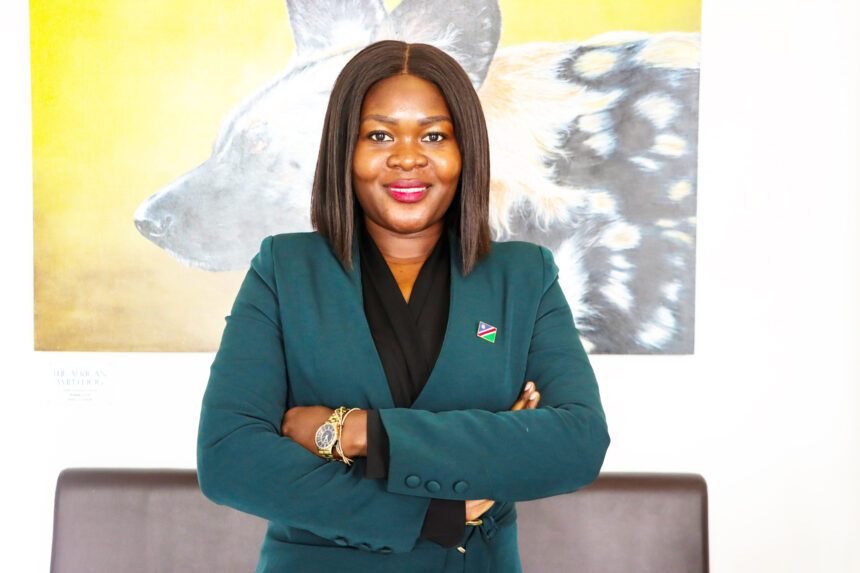Lahja Nashuuta
Mekelaye Kamati is a Chief Legal Officer at the justice ministry within the Directorate of Legislative Drafting.
With more than nine years of experience as a legislative drafter, her duties entail translating policy into law, drafting new laws, amending existing laws, and drafting and scrutinising subsidiary legislation.
She also serves as a legislative advisor to various ministries and government agencies (OMAS).
Kamati is a lawyer by profession with a Baccalaurius Juris degree and a Bachelor of Laws
(Honours) degree obtained from the University of Namibia. She recently attained a master’s in business management, focusing on Intellectual Property.
Enthusiastically, Kamati said she was attracted to legal drafting because of the impact she would make in drafting laws.
Furthermore, ensuring that OMAS and the public’s voices are heard and articulated correctly in legislation.
“My expertise in drafting benefits not only the ministry, but also OMAs and the public at large, because this means the product is a law that is clear, unambiguous, conveys the intended message, and is easy to read and apply. If laws are not in conformity, then there would be a lot of constitutionality challenges, grievances and court cases emanating from the application of such laws,” she said.
Queried on what it takes for one to be a great legislative drafter, Kamati said “It takes great good writing and compositional
skills, an understanding of the legislative process and the law; and for one to be an analytical thinker, be able to draft in simple and clear language, and ensuring that legislation is based on sound legal principles.”
“One needs to pay meticulous attention to details, and have a
clear systematic approach to problems, and to keep up-to-date with events in Namibia and events in the world generally; and be in a position to appreciate political, economic and social policies,” said the lawyer.
Kamati said. As a legislative drafter in the Ministry of Justice, her main goal is to draft laws that are constitution compliant, and considerate of the principles of natural justice, the rule of law and democracy.
Additionally, they draft laws that are fair, just, and in the interest of OMAS and the Namibian nation.
Humble beginnings
Kamati joined the public service in October 2014 as an assistant to the Directorate of Legal Aid and in 2016, she was admitted as a legal practitioner of the High Court of Namibia.
Kamati revealed to New Era that before joining the public service, she was employed at the United Nations High Commissioner for Refugees (UNHCR) for two years, where she interviewed Asylum seekers coming to Namibia.
Outside of the office, Kamati is a traditional enthusiast who spends most of her time learning and teaching traditional Oshiwambo practices and designing traditional Oshiwambo attires.
She lives by the quote “A people without knowledge of their past history, origin, and culture is like a tree without roots” by Marcus Garvey.
Joining public service
Asked why she joined public service, particularly the justice ministry, Kamati said she wanted to apply all the knowledge she obtained from law school.
“I was eager to take on new skills and knowledge, and see whether what I learned in theory was really in practice. I moved to public service for job security and service to the people. Another reason for such a choice was the exposure that public service has to offer, exposure to different topics, cases, and opportunity to challenge oneself and grow in the process,” she said.
Challenges
Legislative drafting is a demanding profession, and is not just a technical exercise as it requires hard work, devotion, attention, patience and the ability to communicate policy in an understandable and user-friendly form.
However, the main challenge for a legislative drafter, the work they do is in the public eye and can be criticised. Thus, there is no room for error. “A drafter never stops reading. Because you are expected to be abreast with all the social, economic and political situations going on in the country and the world, and the fact that one needs to maintain professionalism and neutrality in the law she is drafting. If you are not fully in agreement with what the law represents, you are performing a function in which you are entrusted which is to draft the law and not need necessarily agree with it,” Kamati added.
Future plans
“I will be making my 10th-year mark soon. We will see what life has for me in the coming years, although I can say I am a proud public servant. Honestly, professionally, I love where I am. It is not about titles for me, it is more about the knowledge and exposure I am getting whilst working at the Ministry of Justice.
However, if the job comes with a title, it’s a bonus for me. I would just like to continue growing and being valuable to my employer,” she said about her plans for the future.
-lnashuuta@gmail.com



